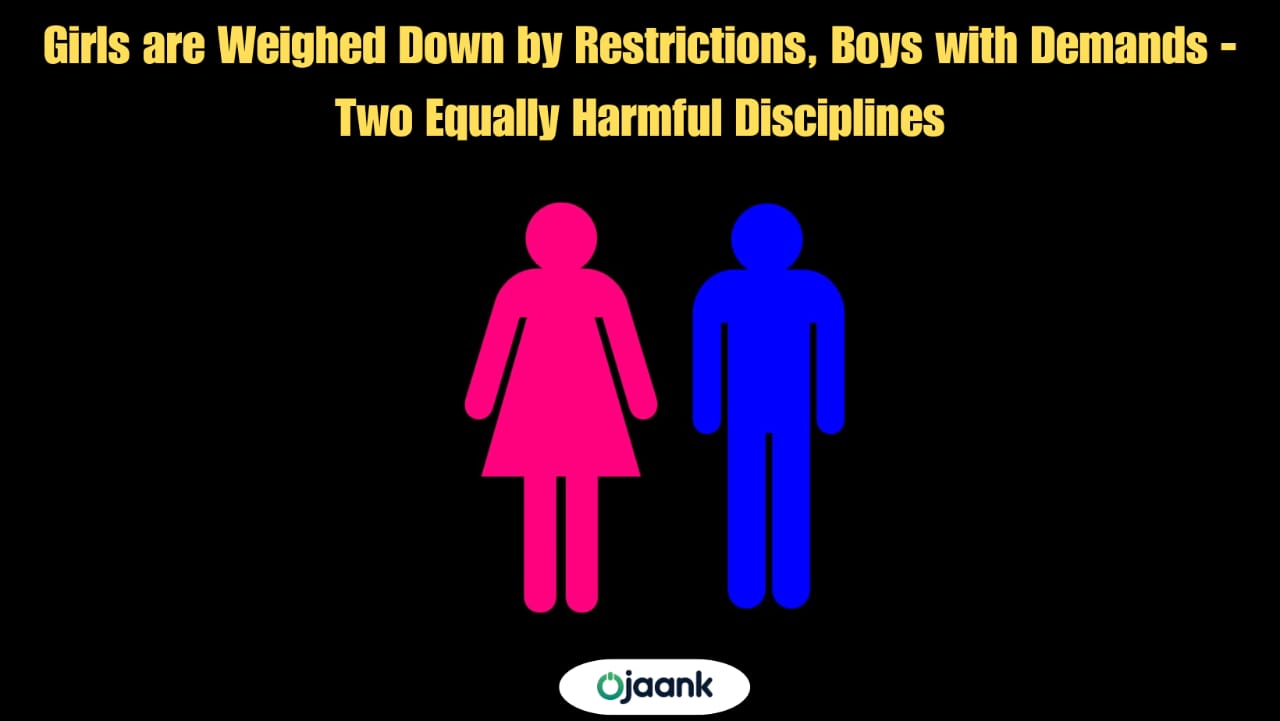Girls are Weighed Down by Restrictions, Boys with Demands - Two Equally Harmful Disciplines

In societies around the world, gender roles and expectations have long played a significant role in shaping the lives of individuals. Girls and boys often find themselves navigating distinct sets of societal norms and constraints, each with its unique challenges. Girls are frequently weighed down by restrictive societal expectations, while boys are burdened with demands of a different nature. In this blog, we will explore the harmful consequences of these gender-specific disciplines and shed light on how both can perpetuate inequality.
Girls: Weighed Down by Restrictions
Girls are often subjected to a myriad of restrictions imposed by society. These restrictions can manifest in various forms, including:
- Dress Code: Many societies dictate strict dress codes for girls, often implying that their clothing choices reflect their character and morality. This can limit their self-expression and restrict their freedom to wear what makes them comfortable and confident.
- Education: In some cultures, girls are discouraged or outright prohibited from pursuing higher education. This limitation not only hampers their personal growth but also hinders their economic independence and career prospects.
- Marriage: Early marriage, forced marriage, or arranged marriage can curtail a girl's autonomy and personal choices, often leading to a life defined by societal expectations rather than her own desires.
- Household Responsibilities: Girls are frequently burdened with household chores and caregiving responsibilities from a young age, limiting their opportunities for personal development and leisure activities.
- Career Choices: Gender stereotypes often steer girls away from STEM (Science, Technology, Engineering, and Mathematics) fields and into traditionally female-dominated professions, reducing their access to higher-paying jobs and leadership roles.
These restrictions can have lasting detrimental effects on girls' self-esteem, self-worth, and overall well-being. Moreover, they reinforce the idea that girls are inherently weaker or less capable than boys, perpetuating gender inequality.
Boys: Burdened with Demands
While girls may face restrictions, boys are often confronted with different sets of demands that can be equally harmful. Some common demands placed on boys include:
- Emotional Suppression: Boys are often expected to suppress their emotions and maintain a facade of stoicism. This can result in emotional repression, leading to mental health issues in the long run.
- Competitiveness: Boys are frequently encouraged to be highly competitive, which can create excessive pressure to excel academically, athletically, or professionally. This constant drive to outperform can be mentally and emotionally exhausting.
- Toxic Masculinity: Society often promotes toxic masculinity, wherein boys are expected to adhere to rigid gender norms, displaying traits like dominance, aggression, and insensitivity. This not only hinders emotional growth but also contributes to harmful behaviors and attitudes.
- Financial Responsibility: Boys are often groomed to be the primary breadwinners of their families, which can lead to enormous pressure to succeed in their careers, sometimes at the expense of their personal happiness.
- Risk-Taking Behavior: Boys are often encouraged to take risks and engage in risky behaviors, which can lead to accidents, injuries, and even fatalities.
These demands placed on boys can result in mental health issues, including anxiety, depression, and a sense of inadequacy. Furthermore, they reinforce harmful stereotypes about masculinity, limiting boys' emotional expression and personal growth.
Harmful Consequences and the Perpetuation of Inequality
Both the restrictions placed on girls and the demands imposed on boys have harmful consequences for individuals and society as a whole:
- Mental Health: Both girls and boys may experience mental health challenges as a result of these societal pressures. Girls may develop anxiety and depression due to restricted opportunities and stifled self-expression, while boys may suffer from emotional repression and competitiveness-induced stress.
- Inequality: These gender-specific disciplines perpetuate inequality by reinforcing traditional gender roles and stereotypes. Girls are taught that their primary role is in the domestic sphere, while boys are conditioned to believe they must excel in the public sphere. This imbalance contributes to gender wage gaps, underrepresentation of women in leadership roles, and limited opportunities for both genders.
- Lack of Empowerment: Girls and boys who are subjected to these harmful disciplines may grow up feeling disempowered and unable to make choices that align with their true desires and aspirations. This lack of empowerment stifles individual potential and creativity.
Breaking the Cycle: Promoting Gender Equality
To break the cycle of harmful disciplines based on gender, it is essential to promote gender equality and challenge traditional gender norms. Here are some strategies to achieve this:
- Education: Implement comprehensive and inclusive education that teaches children about gender equality, diversity, and the harmful effects of stereotypes.
- Parental Role Modeling: Parents can play a crucial role by modeling egalitarian behavior and fostering open communication with their children, encouraging emotional expression for all genders.
- Media Representation: Advocate for more diverse and positive representations of girls and boys in media and entertainment to challenge harmful stereotypes.
- Supportive Communities: Create communities and support networks that encourage open dialogue about gender issues, mental health, and self-expression.
- Government Policies: Lobby for policies that promote gender equality in education, employment, and social services.
Girls and boys are often subjected to harmful disciplines rooted in restrictive societal expectations and demands. These disciplines can have long-lasting consequences on their mental health, self-esteem, and overall well-being. To create a more equitable society, it is imperative that we challenge these gender-specific norms, promote gender equality, and empower individuals to be their authentic selves. Only by dismantling harmful disciplines can we pave the way for a more inclusive and just world for everyone, regardless of their gender.